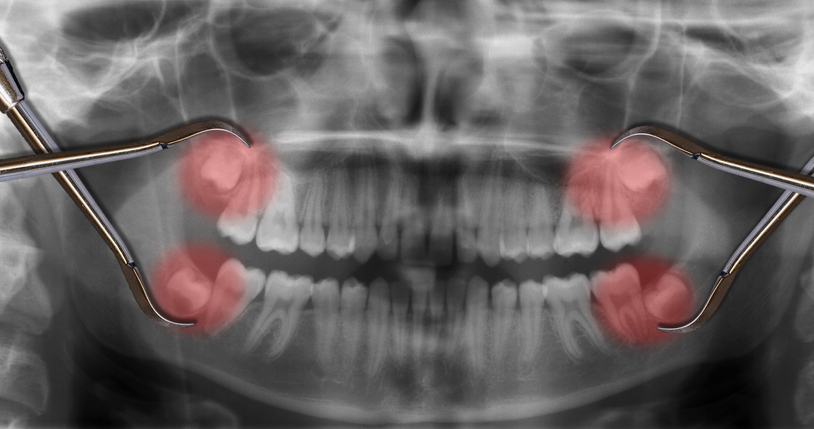Having wisdom teeth removed is not a life threatening procedure. However, there are some risks associated with it. Some of the risks include complications with the procedure, such as infections, damaged neighbouring teeth, and pericoronitis. In addition, there are also risks related to the use of general anaesthesia.
Common complications
Having your wisdom teeth removed can be a relatively simple procedure. However, there are some complications that you may experience. They range from mild to severe. Thankfully, most complications are easily avoidable.
The best way to prevent common complications from occurring is to follow your dentist’s post-procedure instructions. This includes following a soft food diet and keeping your mouth clean. You may also be required to take antibiotics before and after the surgery.
You may experience pain or swelling around the extraction site. However, the pain should subside after a few days. This is a normal reaction to the surgery. If it persists for more than a day, you should contact your dentist.
Bruising is also common. It may be noticeable around the mouth or cheeks. You should change the gauze as soon as it begins to soak up blood.
Dangers of general anaesthesia
Using general anaesthesia for wisdom teeth removal can be a risky choice. The dentist must manage the patient’s airway, and the patient may experience severe gag reflex. If the airway becomes blocked, jaw surgery becomes difficult. The oral surgeon may need to use an endotracheal intubation to help the patient breathe.
The oral surgeon must also monitor the patient’s health and circulation. This can be a challenge when the patient has a seizure disorder. A person with epilepsy may experience seizures while under anesthesia.
Another risk associated with oral surgery is an increased risk of stroke. When the oral surgeon works in the mouth, there are fewer nerves to block. It is important that the patient’s pharynx is cleaned and drained of any secretions.
Occasionally, the oral surgeon may use a breathing tube, or a surgical instrument to help the patient breathe. These can also block the airway, and the oral surgeon may need to use a deep plane of anaesthesia to prevent respiratory depression.
Pericoronitis
Symptoms of pericoronitis can vary from mild to severe. You might notice fever, swelling, difficulty chewing, and bad breath. You might be able to relieve your symptoms by using antibiotics or acetaminophen. You may also be referred to an oral and maxillofacial surgeon for further treatment.
Pericoronitis occurs when the gum tissue surrounding a wisdom tooth becomes inflamed. It is a type of dental infection that can spread to the bloodstream. Severe cases can be life-threatening. It can also be a complication of Ludwig’s angina.
Pericoronitis typically affects people in their 20s. It can be caused by improper oral hygiene or an injury. It can occur in anyone with a wisdom tooth. It’s most common in the area around the bottom wisdom teeth. It can also affect people with impacted molars.
Damage to neighbouring teeth
Having your wisdom teeth removed can be an unpleasant experience. They can be painful and cause infections. They can also weaken your jaw bone. This can lead to tooth loss.
Wisdom teeth are located at the back of the mouth and are at high risk for decay. They are also at high risk for gum disease, which can cause infections. In addition, they can contribute to tooth crowding and orthodontic problems.
The roots of wisdom teeth can put pressure on sinuses, causing sinusitis. They can also cause headaches. The most common complaint about wisdom teeth is pain. However, some may experience a bacterial infection called pericoronitis. This infection causes swelling, fever, and inflammation of the gums.
Wisdom teeth can also cause a cyst to develop. This cyst is a fluid filled sac that can damage the adjacent bone and nerves.
Marek Lapinski’s death
During a routine wisdom teeth removal procedure in Temecula, California, 24-year-old Marek Lapinski fell critically ill. He was transferred to the hospital and died three days later. He was a former college football player who attended Duquesne University and North Allegheny High School in Pennsylvania. He also worked as a software developer and vice president of a San Diego company.
Lapinski’s mother, April, said the family wants a full investigation into the cause of the death. She also has concerns about how Lapinski was monitored and whether or not he was given the proper dosage of anesthesia.
The Los Angeles County Department of Coroner’s office has not completed an autopsy yet. However, the dental expert who examined Lapinski said it’s unclear if something was obstructing Lapinski’s airway. He also said it’s unknown if reflexes were decreased by the sedatives.



